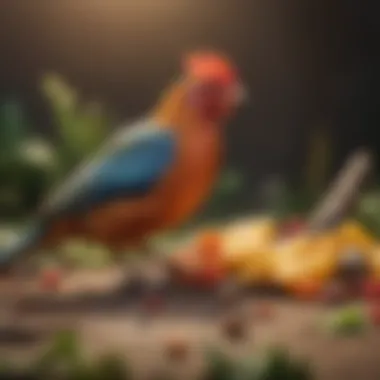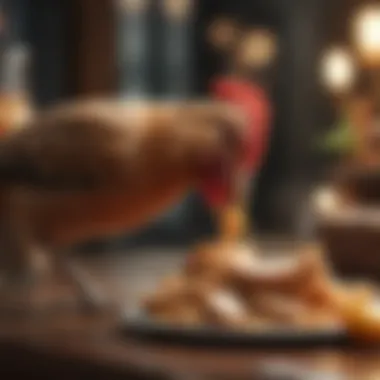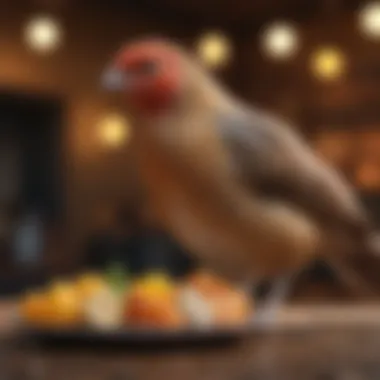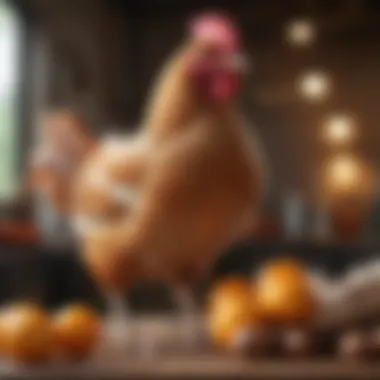Can You Feed a Bird Chicken? Exploring Avian Nutrition


Intro
The feeding habits of birds present unique complexities and implications for their health and nutrition. Bird owners, especially those considering introducing chicken into their dietary balance, often seek clarity on this subject. Chicken contains valuable nutrients, but whether it benefits a bird's diet involves careful consideration of various factors. Approaching this topic with an analytical mindset is essential. Understanding the nutritional requirements of different bird species, alongside a thoughtful examination of the risks and potential gains of feeding chicken, plays a pivotal role in catering to avian health.
An exploration of how chicken can fit into the broader context of avian diets reveals several pressing questions. What nutritional elements does chicken offer? Are there specific preparation methods that enhance or mitigate risks? Furthermore, what guidance do experts provide on integrating this type of poultry into a bird's nutrition plan? This article endeavors to uncover these intricacies for bird owners seeking comprehensive knowledge on the subject.
Care Tips
Providing exceptional care for pet birds involves multiple facets, ensuring their health, environment, and nutrition are optimized. In understanding how resident chickens, primarily composed of poultry, fits into a bird's diet, attention must be paid to the practicalities of daily care. Adjustments in care profiles according to seasonal shifts enhance a bird's overall well-being. Here are critical components of establishing an effective care regimen:
Daily Care Routines
Daily routines vary among species, so recognizing specific needs and behaviors is paramount. Generally, providing fresh food and water daily, cleaning food and water enclosures, and checking for signs of happiness or distress is fundamental for a bird’s well-being. Fresh fruits and vegetables can form a basis for daily feeding, next to small quantities of cooked chicken if allowed.
Cage Setup and Maintenance
Birds require ample space to move freely. A well-maintained habitat involves providing shredded paper or safe liners to keep areas clean and soothe instincts to nest. Regular adjustments to furniture support mental stimulation and physical health. Remember that altitude, perch options, and privacy significantly influence the birds' comfort levels.
Hygiene and Cleaning Practices
Hygiene remains a critical aspect of bird care. Regular cleaning of perches, food containers, and toys prevents health complications. Utilizing safe antibacterial solutions is recommended, ensuring all items are rinsed properly before reassembly. Regular disinfecting aids in creating an unhealthy atmosphere, reducing risks of diseases such as colds or Bacterial infections amongst birds.
Seasonal Care Adjustments
Adapting routines with changes in seasons is beneficial. During warmer months, ensure birds have available areas with shade and water access. During winter, securing adequate warmth while ensuring removal of drafts continues to pave the way for healthy habits. Periods of shorter daylight might also warrant balanced artificial light solutions to mimic the sun.
Behavioral Insights
Recognizing the behavioral patterns of birds provides clues to ferreting out their emotional and mental states. Understanding companionship needs often varies between individual species and pair bonds, shaping the time and attention dedicated by the owner.
Understanding Bird Body Language
Birds communicate moods and reactions visibly through body language. Postures such as puffed feathers, raised crests, or wing flapping often reflect their concerns. Familiarity with unique signs from individual species aids in making logistical decisions benefiting both bird and keeper.
Common Behavioral Issues and Solutions
Common behavioral problems include excessive noise and feather plucking. Intervention strategies such as increased exercise, tailored interactions, or potential consultation with animal behaviorists can mitigate persistent issues. Ensuring positive experiences promote harmonious cohabitation.
Positive Reinforcement Techniques
Utilizing positive methods, such as clicker training or treats appreciates cooperative tasks and reinforces trusting relationships. Rewarding a bird’s eagerness to interact often yields an enriched and responsive environment.
Social Interaction Needs
Birds are inherently social creatures, demanding sufficient interaction with their accustomed owners or flock members. Integrating interaction at various intervals throughout the day establishes bonds alongside feeling secure in their environment.
Nutrition Guides
Nutritional balance represents inevitably crucial to owning a bird. In-line with examining poultry feeding, identifying essential diet components, accompanied risks, and associated practices determines optimal husbandry for birds. Here, we examine those fundamental areas thoroughly.
Essential Diet Components
The core dietary components include high-quality seeds, pellets, fruits, and vegetables. Balancing protein intake remains necessary when introducing considerations of including chicken systematically. Protein-heavy dishes can bolster growth successfully during crucial phases while ensuring repetitions of good nutrition.
Safe and Toxic Foods
Certain human foods deliver significant nutritional surprises, with several appearing beneficial but posing risks. Avocado, chocolate, and caffeinated products remain strictly toxic to birds. Knowledge of safe alternatives allows for safer easing into dietary flexibility, contributing to healthy menus.
Supplements and Treats
Supplementation should crown a balanced diet as physicians recommend use cautiously since amounts vary by species. Calcium, vitamins, and omega-3 deserve control scrutiny when integrating alongside staple avian nutrients intended as added safety margins towards enchantment of health profiles.


Feeding Strategies for Different Species
Tailoring feeding strategies to accommodate diverse species garners considerable attention. Budgerigars may require different selections compared to parrots with concluding preferences showcasing substantial variations in appetite alongside developmental modalities desired while showcasing particular frequents of inquiry or interest stellar results follow intentional methods targeted appropriately.
Effective bird nutrition hinges upon a harmonious balance of fresh foods, appropriate supplements, and species-specific strategies tailored to an individual bird's needs.
Wellness and Health
Moreover, sets creature wellness indicators alongside health standards within recognized stops pontification regarding prior nutrition terrific two directions of forecast grafts rendering controlled necessities aware of maintenance succedechat reduces accidents harm wellbeing damaging prolonged excessive nutritional imbalance swings.
Enriching Activities
Engaging space boasting interactive accessories furnishing fulfillment encompasses no shortage prompting types necessities increasingly assures multisensory display within captivity yielding timeliness fostering growth among strong effects enrich.
Prolusion to Avian Nutrition
Avian nutrition is a critical aspect that underpins the health and well-being of pet birds, as it is often a determining factor for their overall quality of life. Understanding what constitutes a proper diet is essential not only for the physical health of birds but also for their behavior and longevity.
Importance of Diet in Bird Health
A balanced diet is vital for birds just like it is for humans and other animals. Nutrients from their food play a crucial role in all aspects of their health.
- Physical Well-being: Proper nutrition helps regulate metabolism, supports healthy weight, and ensures strong bones, feathers, and beaks. Feeding birds a diverse range of nutrients prevents common health issues, such as obesity or malnutrition.
- Behavioral Factors: Insufficient nutrition can lead to behavior issues, such as aggression or excessive screaming. A varied diet may reduce stress and make birds more content in their environment.
- Development: Young birds, in particular, require specific nutrients for proper development as they grow. This importance extends to crucial early stages as well, such as fledging.
- Recovery: Birds that are ill or recovering from injuries often need re-evaluation of their diets to promote healing.
It’s clear that diet significantly impacts how birds live their daily lives.
Common Misconceptions about Bird Diets
Many misunderstand the complexity of avian diets, leading often to harmful practices. There are several common misconceptions that need addressing:
- Seeds Are Enough: Some believe that seeds alone provide complete nutrition. Seeds can lack essential vitamins and minerals needed for overall health. Always supplement a seed diet with fruits, vegetables, or pellets to ensure a full intake of nutrients.
- All Table Foods Are Safe: Many bird owners may think that all human food is suitable for pet birds. Certain foods like chocolate, avocado, and caffeine are dangerous. It’s critical to understand which foods are safe and which foods are poisonous to birds.
- Birds Won't Overeat: It’s a common belief that birds will self-regulate their food intake. However, this is not applicable if the diet consists mainly of high-fat seeds or unhealthy snacks. Monitor portion sizes to maintain a healthy weight.
Balanced nutrition is the cornerstone of a happy and healthy bird life. Addressing these misconceptions sets the stage for a well-informed approach to avian care.
Nutritional Needs of Birds
Understanding the nutritional needs of birds is crucial for their overall health and well-being. Different species have diverse dietary requirements that must be met for them to thrive. As avian companions, their diets play a significant role, not just in their physical health but also in their psychological well-being. The protein, fats, carbohydrates, vitamins, and minerals influence everything from energy levels to feather health. A well-rounded diet ensures birds maintain good condition and helps prevent diseases.
Essential Nutrients Required
Proteins
Proteins are essential for birds as they support growth, maintenance, and repair of body tissues. They are composed of amino acids, some of which birds cannot synthesize on their own and must obtain from their diet. Protein is crucial for feather growth and muscle development, contributing to a bird's ability to fly and perform daily functions. A highly beneficial source of protein includes cooked chicken. However, care should be taken to balance protein intake to avoid excessive levels, which can lead to health issues.
Fats
Fats serve as a concentrated source of energy, making them a necessary part of a bird's diet. They contain fatty acids that support skin and feather health. However, moderation is key; excessive fat can lead to obesity, which raises the risks of various health problems. While fats are often viewed as less desirable, small quantities from chicken meat can be highly beneficial if the type and amount are monitored. Optimal fat consumption allows birds to stay warm and maintain energy levels throughout the day.
Carbohydrates
Carbohydrates are another important energy source. They provide quick energy, essential for birds that engage in high levels of activity. Fruits and certain grains are ideal sources of carbohydrates, allowing birds to have stamina and maintain their metabolic processes. Slow-release carbohydrates, like those found in specific vegetables, can also prevent sudden spikes in energy, keeping them balanced. However, too many carbohydrates can lead to weight gain, making moderation essential.
Vitamins
Vitamins are necessary for a handful of physiological functions. They support immune function and contribute to the overall health of feathers, skin, and bones. Water-soluble vitamins, like B vitamins, and fat-soluble vitamins, such as vitamins A, D, E, and K, play various roles in maintaining a bird's health. Adding colorful fruits and vegetables provides the additional vitamins often missing from seed-based diets. Lack of vitamins can lead to various deficiencies, so careful attention to diet is necessary to ensure_vital nutrient levels are met.
Minerals
Minerals like calcium, phosphorus, and potassium are key for bone health, muscle function, and nerve signaling. Calcium is particularly crucial for birds, aiding in egg production and strengthening bones. Calcium-rich foods in the correct proportions contribute significantly to a balanced diet. It's essential to ensure birds can get these minerals through a variety of food sources, including mineral blocks or specific supplements when necessary. A deficiency can cause serious health problems in birds, emphasizing the importance of adequate mineral intake.
Variations among Species


Small Birds
Small birds, such as finches and budgerigars, require a diet tailored to their size and energy needs. They typically benefit from high-fat seeds and specific formulated small bird pellets. Before introducing chicken into their diet, it's prudent to consider their size. The aim should be to offer chicken in a finely shredded format to make digestion easier. Portion control is essential as excessive heavy protein can cause issues for smaller grace.
Medium Birds
Medium size birds like cockatiels need a well-rounded diet comprising seeds, fresh fruits, vegetables, and occasional lean proteins. Their diets can successfully include chicken occasionally. However, it must be well-cooked and simply served without seasoning. This ensures that flavorful food is provided without the risk of potential health complications. Care should be taken to assess individual tolerance and preferences since dietary behavior can vary significantly among medium-sized companions.
Larger Birds
Larger birds, such as macaws and amazons, have different needs due to their size and activity level. Their diets usually consist of larger amounts of fresh fruits, vegetables, and nuts, along with proteins like chicken. They tend to require a good balance of high-fat to energy ratio. Large birds often need more protein, and cooked chicken can be a viable part of this balanced approach. Offering chicken in an appropriate size helps prevent choking risks or unintended prowess while feeding time.
Feeding Chicken to Birds
Feeding chicken to birds has become an area of interest for many avian caretakers. It defines a unique aspect of bird diets that may challenge traditional beliefs. On one hand, chicken contains beneficial nutrients. On the other hand, there are potential risks that must not be ignored. This section will explore the considerations needed when deciding if chicken can be safely included in avian diets.
Is It Safe to Feed Chicken?
Determining the safety of chicken is crucial. Domestic chickens are common protein sources. However, preparation matters. Raw chicken poses a risk of bacterial contamination. Cooking chicken safely can mitigate this concern. Moreover, it is essential to avoid seasonings or additives that may be harmful for birds.
Nutritional Benefits of Chicken
High Protein Content
Chicken is renowned for its high protein content. This attribute supports muscle growth and repair. For many pet birds, especially those needing increased protein, chicken can be a valuable addition to their diet. The protein present aids in the maintenance of feathers and skin health, thereby enhancing overall vitality. Nevertheless, it is crucial to balance the protein supply with other nutrients to ensure a well-rounded diet.
Amino Acids
Chicken contributes essential amino acids. These compounds are the building blocks of proteins. They play pivotal roles in various physiological functions, including hormone synthesis and immune response. Hence, incorporating chicken can promote a healthier respiratory system in birds. Birds, however, may require more specific amino acids not provided solely by chicken. Consulting an avian veterinarian regarding diet should be considered for comprehensive nutrient assessment.
Potential Risks of Feeding Chicken
Fat Content
While chicken contains protein, its fat content requires careful examination. High-fat content can lead to obesity in birds. Certain species are especially prone to weight gain, making fat content a considerable concern. Lean cuts of chicken are more appropriate choices. Nevertheless, understanding individual bird dietary needs remains vital to avoid potential health complications.
Potential Pathogens
The risk of pathogens is an important factor when discussing poultry. Contamination like Salmonella may affect both humans and birds. Effective cooking methods can reduce bacteria, but careful handling is also necessary to prevent cross-contamination. Cleaning surfaces and utensils can ensure a safer feeding environment for aviaries. Proper awareness of this risk aids in protecting bird health, especially during food preparation.
Caloric Imbalance
One common challenge with chicken is managing caloric intake. Birds fed a diet too heavy in calories can experience weight-related health issues. Considering chicken provides a dense calorie source, monitoring portions is critical. Pairing chicken with lower-calorie vegetables and fruits can help create balance in the diet. Regular handling of bird weight and activity levels will help assess if caloric intake remains appropriate.
Feeding chicken offers unique challenges and benefits. Awareness can significantly aid in maintaining avian health.
Best Practices for Preparing Chicken for Birds
Preparing chicken for birds might seem simple but involves careful consideration of the type and method of preparation. This really helps to enhance the bird’s diet without causing any harm. Abiding by best practices involves not just the type of chicken fed but also ensuring safe cooking methods. This maximizes the nutritional benefits and minizes potential health risks.
Choosing the Right Chicken Type
Organic vs.
Conventional Choosing between organic and conventional chicken is a key element in ensuring avian nutrition. Organic chicken generally comes from birds that have been raised without antibiotics and are fed organic feed. Most bird owners prefer organic chicken because they feel more secure about the rearing conditions. On the other hand, conventional chicken might be cheaper and more readily available, but often contains additives that could complicate dietary purity.
The unique element of organic chicken is its rearing system, which prohibits hormones and antibiotics, perhaps leading to cleaner and healthier meat for birds. Though often considered a better choice, organic chicken requires a higher price point and sometimes limited availability.
Lean Cuts
Focusing on lean cuts is crucial when supplying chicken to birds. Cuts like breast are lower in fat and therefore a healthier option for these pets. High-fat chicken can lead to obesity and other health concerns. Choosing lean cuts supports dietary balance while providing the necessary nutrients, making it a favorable choice for bird owners.


The very low-fat content of lean cuts promotes overall health without statring caloric oversupply. Discounts often ignore specific breeds or cuts, so being selective can lead to healthier life choices for competently keeping your birds fit.
Safe Cooking Methods
Boiling
Boiling chicken is perhaps one of the best cooking methods for preparing poultry for birds. It keeps the meat tender and easy to digest while eliminating harmful bacteria. The high temperatures involved in boiling kill off potential pathogens. Furthermore, boiling does not require adding any unhealthy fats or oils.
A key characteristic of boiling is its simplicity and ability to retain many nutrients. However, ensuring that chicken is fully cooked is key, as partially ungocked chicken risks potential illness for birds.
Baking
Another safe cooking method is baking. This method allows chicken to cook through without extra oils that might negatively impact avian health. Baking at a moderate temperature retains the flavor of chicken while ensuring a proper aroma that some birds may find appealing. The scent can even stimulate birds appetites.
It's noteworthy that the baking process should be adequately monitored. Leaving chicken too long can lead to burning, ruining nutritional value and safety. Properly adjusted time and temperature can yield beneficial results.
Avoiding Seasoning
One significant recommendation when preparing chicken for birds is to avoid seasoning completely. Many spices and ingredients we cook with can be harmful to birds. Salt, for example, can lead to kidney problems and serious health issues in avian species.
The focus should be on providing pure chicken meat without additives. Not seasoning ensures that the natural flavors come forth, adhering to a clean diet that helps in healthy avian growth and maintenance. Plus, seasoning takes away from your birds experience of natural nutrients depicted in the protein while possibly introduced unwanted effects.
Expert Recommendations
Understanding expert recommendations is vital when considering a bird’s diet that includes chicken. Insights from professionals help bird owners make informed decisions, preventing potential pitfalls while promoting optimal health. Given that each bird species has unique nutritional demands, veterinarians and seasoned bird owners provide essential guidance tailored to individual needs. Their knowledge gives a strong base for anyone serious about their pet’s diet.
Opinions from Avian Veterinarians
Avian veterinarians emphasize a cautious approach when feeding chicken to birds. Their insights underscore the need for balance in diets, stressing that chicken should not exceed 10% of a bird's total dietary intake. This recommendation ensures that birds receive a diverse nutrient profile that can be compromised when relying too heavily on any single food source.
Veterinarians also point to the necessity of preparing chicken safely. They recommend cooking methods that avoid fats and seasoning, reinforcing that plain, unseasoned chicken is safest for birds. Furthermore, they provide crucial information about species-specific considerations, emphasizing that what works for one bird might not apply to another.
"Always consult with your veterinarian before making significant changes to your bird's diet."
Veterinarians assess the health status of individual birds to ensure compatibility with chicken. For example, birds with underlying health issues may need specialized diets that do not include poultry at all. Other infections might intensify when exposed to potential pathogens present in improperly handled chicken.
Guidance from Experienced Bird Owners
Input from seasoned bird owners showcases practical wisdom amassed through real-life experimentation with avian diets. These veterans of avian care frequently share their experiences, illustrating the relevance of observing birds' reactions to new foods. It is advisable to introduce chicken gradually to observe dietary acceptance and to monitor any changes in behavior or health.
Moreover, many experienced owners emphasize the joy of variety. They advocate for mixing chicken with other food sources, such as fresh fruits, vegetables, and fortified pellets. This approach broadens the nutritional spectrum while making meals more appealing to birds without monopolizing their diet.
Tips from veteran owners often include:
- Ensure the chicken is fully cooked and unseasoned.
- Prioritize fresh ingredients when feeding.
- Observe the bird’s response to the new diet.
Through these shared stories and insights, experienced bird owners play a significant role in ampliming avian health knowledge, emphasizing listening to one’s instincts combined with expert advice while feeding chickens to birds.
End
In discussing whether to include chicken in a bird’s diet, this article circles around vital points of avian nutrition. Feeding chicken can appear appealing to bird owners due to its high protein content; however, the implications are multifaceted. Each point raised carries weight.
Summarizing key insights from this exploration:
- Nutrition is individualized based on a bird’s species, size, and dietary needs.
- Chicken, while beneficial, poses risks if not carefully moderated.
- Proper preparation methods enhance food safety and nutritional value.
These insights direct bird owners toward informed decisions. The awareness of dietary requirements should prevail in feeding practices. Understanding complextities of chicken nutrition encourages a balanced inclusion.
Making Informed Dietary Choices
To make the right choices, it's important for pet bird owners to evaluate options based on research and evidence. Considerations should include:
- Species-Specific Needs: Different pet birds require different diets. For instance, smaller birds have specific grains while larger ones may tolerate moist foods like poultry.
- Amount and Frequency: Chicken should remain a treat rather than a staple in avian diets to prevent caloric imbalance as well as tax the digestive systems.
- Quality of Ingredients: Whether the chicken is organic or conventional matters significantly. Organic chicken tends omake a healthier choice.
"Feeding chicken properly hinges on understanding each bird’s unique requirements. Evaluating food choices helps in promoting overall wellness".
In acting judiciously over diet, bird owners promote health. Advocating research goes beyond just chicken; it develops a guided philosophy that enhances exercise lifestyles of healthy birds.















